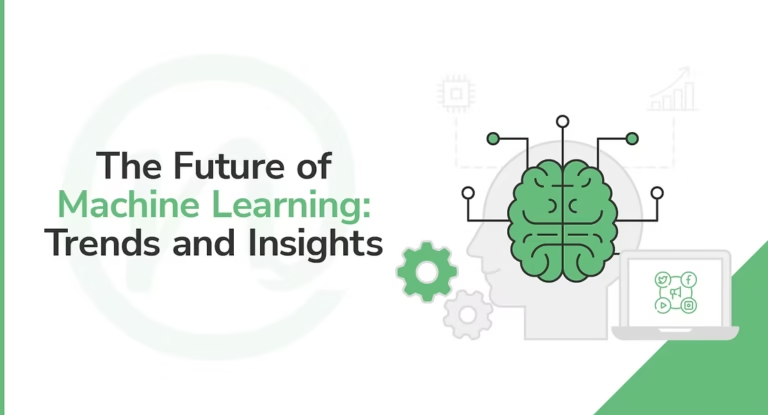Introduction
Machine Learning (ML) is transforming the world at an unprecedented pace, powering breakthroughs across industries such as technology, healthcare, finance, and beyond. From virtual assistants to self-driving cars, ML has emerged as a critical tool for companies seeking to leverage data-driven insights and automation. This surge in ML's application is directly reflected in the demand for skilled ML engineers, data scientists, and AI specialists, signaling a strong the future of ML careers.
According to a 2022 LinkedIn report, artificial intelligence roles, including ML, saw a 74% annual growth rate over the previous four years in the U.S. alone. As companies increasingly incorporate AI, the demand for engineers proficient in machine learning continues to grow. However, to capitalize on these opportunities, aspiring engineers must not only understand current trends but also anticipate the future trajectory of this fast-evolving field.
In this blog, we'll explore the future of ML, covering career opportunities, emerging trends, and how engineers can prepare themselves for a thriving career in the ML space.
Current State of ML Careers
The demand for machine learning engineers has skyrocketed over the past decade. A report from the U.S. Bureau of Labor Statistics projects that jobs in the field of data science and ML will grow by 31% from 2019 to 2029, making it one of the fastest-growing fields in tech. This demand is driven not only by tech giants like Google, Amazon, and Microsoft but also by a range of industries including healthcare, finance, retail, and manufacturing.
In 2022, tech company job postings in ML grew by over 20%, with salaries for ML engineers ranging from $112,000 to $165,000 annually, depending on location and experience. The healthcare industry, in particular, has embraced ML for medical diagnostics, personalized treatments, and drug discovery, while financial services use ML for fraud detection, algorithmic trading, and risk assessment.
“The impact of AI and ML will be greater than electricity and fire,” said Sundar Pichai, CEO of Google, emphasizing just how transformative these technologies are expected to be.
With such massive potential, ML professionals are now key players in driving innovation, helping businesses harness the power of predictive analytics, automation, and decision-making algorithms. But the current boom is only the beginning, and future trends promise to further reshape the job market.
Key Trends Shaping the Future of ML
Automated Machine Learning (AutoML)
One of the most significant trends shaping the future of ML is Automated Machine Learning (AutoML). AutoML seeks to simplify the process of building ML models, making ML more accessible to non-experts and speeding up the development lifecycle. This raises questions: will AutoML reduce the need for traditional ML engineers?
While AutoML does indeed automate many of the tedious steps involved in ML model creation, such as hyperparameter tuning and feature selection, it won’t eliminate the need for human expertise. Instead, it will allow ML engineers to focus on higher-level tasks like solving complex problems, designing more sophisticated models, and ensuring ethical use of AI.
AutoML tools like Google Cloud AutoML and Amazon SageMaker are already in use, allowing businesses without extensive ML expertise to build robust models. A McKinsey report on AI adoption suggests that by 2030, AutoML could be pivotal in allowing small and medium-sized enterprises to leverage ML without needing in-house AI experts, but highly skilled engineers will still be required to oversee, interpret, and optimize these systems.
Responsible AI and Ethical ML
As ML becomes embedded in more applications, the ethical challenges surrounding AI have become more pressing. The development of fair, transparent, and unbiased algorithms is no longer optional; it is a priority for businesses. Ethical AI practices, including the mitigation of bias and ensuring explainability, are creating new career opportunities in AI ethics and policy development.
As former IBM CEO Ginni Rometty famously said, “The future of AI is transparency.”
Companies are now racing to hire professionals who can not only build ML models but ensure that these models align with ethical standards and regulatory requirements. As a result, job roles like "AI ethicist" or "AI fairness specialist" are emerging to address these growing concerns.
Edge Computing and ML
The convergence of edge computing and ML is another trend shaping the future of AI. Traditionally, ML models have been cloud-based due to the large amounts of data and computational resources required. However, edge computing is enabling ML models to run directly on devices, reducing latency and providing real-time data processing. This is particularly important in industries like autonomous vehicles, robotics, and IoT (Internet of Things), where low-latency decisions are critical.
The global edge AI hardware market is expected to grow at a compound annual growth rate (CAGR) of 20.6% from 2021 to 2026, according to a MarketsandMarkets report. This trend is creating demand for engineers who specialize in optimizing ML models for edge devices, offering a niche but growing career path in the ML field.
ML and Quantum Computing
Quantum computing, though still in its infancy, promises to revolutionize how ML models are trained and optimized. Quantum computers can process complex calculations much faster than classical computers, offering new possibilities for ML in fields such as cryptography, drug discovery, and climate modeling.
Companies like IBM and Google are investing heavily in quantum ML research. While quantum computing is still years away from becoming mainstream, engineers who gain expertise in both ML and quantum principles will be in high demand for pioneering roles.
Natural Language Processing (NLP) and Generative AI
Natural Language Processing (NLP), which focuses on teaching machines to understand and generate human language, has experienced explosive growth. The release of powerful language models like GPT-3 and BERT has accelerated this trend. These models are capable of performing a variety of tasks, from writing code to answering complex questions, making NLP one of the most exciting fields within ML.
Generative AI, in particular, is creating new job roles for engineers who specialize in optimizing large language models for specific business applications. As more companies adopt conversational AI for customer service, marketing, and product design, the demand for NLP engineers is set to rise.
Career Opportunities in ML
With the rise of ML across multiple sectors, new and evolving career opportunities are emerging for software engineers. Here are some of the top roles in ML:
Machine Learning Engineer: ML engineers are responsible for building and deploying ML models. Salaries range from $112,000 to $160,000 per year, according to Glassdoor, with top companies paying even higher for experienced professionals.
Data Scientist: Data scientists analyze data and build statistical models to predict future trends. They often collaborate with ML engineers to turn models into production-ready solutions. Salaries typically range from $95,000 to $140,000.
AI Researcher: AI researchers focus on advancing ML algorithms and methodologies. These roles are usually found in R&D departments of large tech companies or research institutions. Salaries for AI researchers can exceed $150,000, depending on experience and the complexity of the work.
ML Ops Engineer: As ML models become more complex, the demand for ML Ops engineers, who specialize in deploying and maintaining ML systems in production, has risen. This role ensures that models are scalable, reliable, and efficient in real-world applications.
Emerging areas like AI ethics and AI explainability are also opening up specialized roles. In these positions, engineers focus on ensuring transparency in AI decision-making, especially in regulated industries like finance and healthcare.
How to Prepare for a Career in ML
The demand for ML talent is growing, but so is the competition. Here’s how aspiring ML engineers can best prepare for the evolving job market:
Educational Pathways: While traditional degrees in Computer Science or related fields remain valuable, online certifications are becoming increasingly respected. Courses from platforms like Coursera, edX, and InterviewNode can provide practical skills, and certifications like Google’s Professional ML Engineer or AWS Certified Machine Learning Specialty offer a competitive edge.
Practical Projects: Hands-on experience is key. Working on ML projects, such as building image classifiers, recommendation systems, or NLP models, allows candidates to apply theory to practice. Platforms like Kaggle provide datasets and competitions to hone problem-solving skills.
Building a Portfolio: A strong portfolio on GitHub, showcasing both collaborative and solo projects, can set candidates apart. It’s crucial to demonstrate not just technical proficiency but also an ability to solve real-world problems.
Interview Preparation: ML-specific interviews often focus on problem-solving, algorithmic thinking, and coding skills. Practicing on platforms like LeetCode and participating in mock interviews can help candidates prepare for the rigorous interview processes at top companies.
Future Challenges and Opportunities in ML
As ML continues to evolve, so do the challenges. Engineers will need to stay ahead of the curve by continuously updating their skills. Emerging technologies like quantum computing and advancements in ML algorithms will require constant learning.
At the same time, cross-disciplinary roles that combine ML with other fields, such as healthcare, cybersecurity, or robotics, are becoming increasingly important. Engineers with a strong grasp of both ML and domain-specific knowledge will be in high demand.
Finally, the democratization of ML tools and platforms is making it easier than ever to launch startups in the ML space. Entrepreneurial-minded engineers can capitalize on this by developing AI-driven solutions for untapped markets, opening up new opportunities beyond traditional career paths.
Conclusion
The future of machine learning is filled with immense opportunities and exciting trends. As companies continue to embrace ML across sectors, the demand for skilled engineers will only grow. Whether you're looking to break into the field or advance your career, the time to prepare is now.
By staying informed about key trends such as AutoML, ethical AI, and quantum ML, and by building a robust skillset through education and practical experience, aspiring engineers can position themselves for long-term success in this fast-evolving field. The future of ML is bright, and with the right preparation, you can be a part of it.






